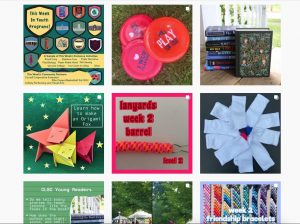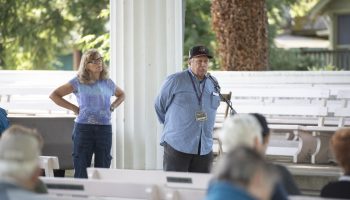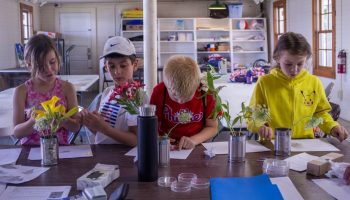 Each summer, more than 10 million kids in America spend their days at camps or youth programs exploring outside, making friendship bracelets and tie dye T-shirts, playing games with friends or learning new skills and hobbies.
Each summer, more than 10 million kids in America spend their days at camps or youth programs exploring outside, making friendship bracelets and tie dye T-shirts, playing games with friends or learning new skills and hobbies.
Typically, days like this might end around a campfire roasting marshmallows, or in a log cabin packed full of friends. Chautauqua Institution, has, for years provided traditional and engaging summer camp and youth programs for children and teenagers on Chautauqua’s grounds. A variety of activities and classes have been available for children for decades through the Children’s School for ages 3 to 5, Group One for students entering first grade and the Boys’ and Girls’ Club, which has programs for grades two through 10.
This season at Chautauqua is full of interesting and educational programs for children of all ages, just like seasons of the past. The only difference? Each of the programs is now online.
Instead of bug spray and baseball caps, Chautauqua’s youth need an internet connection, an open mind and a sense of creativity.
Director of Youth and Family Programs Alyssa Porter was adamant that this year’s experience will not be the same — and that it is not meant to be.
“It was important to me as we started this process that we didn’t try to replicate our youth activity experiences as online programs, because there is the magic of being a young person on Chautauqua’s grounds that you just aren’t going to get through a screen,” Porter said. “However, now family members, siblings and parents can participate in a new way, and that is something I’m excited about.”
The programs themselves will not, for the most part, be broadcast live, but there will be opportunities for live meetings and collaborations. Each different program is hosted on the CHQ Assembly Online Classroom and will allow participants to tune in to a video to learn about the day’s activities or receive prompts, which they will then complete on their own or with family members before returning for a re-cap of the day with their counselors.
One key concern for Porter and her coworkers is the mental health of children and young adults through the progression of the pandemic. News reports have shown an increase in anxiety levels in children and Porter realized that making connections with friends was now especially difficult.
“We want our kids to have a sense of normalcy at a time when the world is so chaotic,” Porter said. “I want to make sure that the mental health and well being of our young people was first and foremost in our goals, which is what we are trying to accomplish here.”
In order to help facilitate the transition to online activities while retaining a sense of community, the youth and family programs have stretched into the world of social media, sometimes reposting content from the virtual classroom, and sometimes sharing something completely original via the video app TikTok or the social media site Instagram, both with the handle @chq_clubhouse.
“This is an important element for me because the Online Classroom is so new for our families that I wanted to make sure that we were in a space that was familiar to young people as well,” Porter said. “We are using it as an additional tool to really connect and bring people together.”
Chautauqua offers an array of unique programming, from nature and art programs to literary classes and STEM camps, each led by counselors who have helped to design the programs. The counselors were given full creative freedom to construct the programs, something that Porter thinks has helped to keep the excitement alive.
The new classes and programs will appear hand-in-hand with many Chautauqua traditions, such as making friendship bracelets or lanyards; The Boys’ and Girls’ Club tradition of tie-dye events has migrated onto social media, where there is a weekly “Tie-Dye Tuesday” livestream.
“Beyond the traditions, it was really up to my counselors to decide what they were passionate about and what they thought would work well within this format,” Porter said. “None of us have the roadmap for how this works, so we can’t be afraid to make mistakes or share ideas because that is what helps keep this exciting and interesting.”
Porter hopes the experiences that children have in the youth programs will be ones that they carry with them throughout life, especially in uncertain times.
“Some of what we forget as adults is that those activities and arts and crafts that we learn as kids in youth programs can become great self-care tools and coping skills,” Porter said. “It’s especially important now to take care of yourself.”




